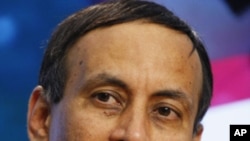Pakistan Ambassador to the United States Husain Haqqani is defending his country's decision to round up more than 30 people as part of an investigation into the Osama bin Laden compound.
U.S. - Pakistani ties have been facing increasing challenges in the wake of Osama bin Laden's death. Last week, it was reported Pakistani authorities arrested four informants who helped U.S. intelligence find the former head of the al-Qaida terrorist network.
Ambassador Husain Haqqani says the individuals who have been rounded up in Pakistan are part of an effort to find out what happened and how, and who was involved. "We will be dealing with each one of them on the basis of what information they have. As far as the concern that there are people amongst the people that we have rounded up who were informants for the CIA, we will deal with them as we would deal with a friendly intelligence service, and we will resolve this to satisfaction of our friends, as well as to our own laws," he said.
Haqqani made his remarks on the ABC This Week news program.
He was referring to a New York Times report last week that quoted U.S. officials who said Pakistan had arrested informants, including a Pakistani army major, who fed the CIA information that led to the May 2 U.S. military raid near Islamabad that killed al-Qaida leader Osama bin Laden.
He said it was wrong to think, however, that Pakistan was punishing and detaining the people that led the United States to bin Laden. "That is an incorrect characterization for the simple reason that the people who led the Americans to the [Osama bin Laden] compound included many people from Pakistan's government. After all, the first intelligence step that enabled the U.S. to piece together the intelligence that got them there came from the Pakistani authorities," he said.
Pakistan's military have called the New York Times report "false and totally baseless," but a military spokesman told VOA last week that several people have been detained.
The spokesman refused to clarify what charges the informants faced.
Questions over U.S.- Pakistan ties have been growing in the wake of the raid, and the rounding up or arrest of informants has put additional strains on the relationship.
|
VOA’s Ira Mellman reports one South Asia expert says Pakistan is looking ahead to the day when the United States no longer has a major presence in neighboring Afghanistan. |
U.S. Congress members on both sides of the aisle have expressed concerns about the relationship following The New York Times report, and earlier accounts of leaks from the Pakistani security apparatus that foiled raids on militant bomb factories along the Pakistan-Afghan border.
This, in turn, is threatening support for U.S. aid to Pakistan.
When asked whether the United States and Pakistan were close to a breach in ties on the program Fox News Sunday, Secretary of Defense Robert Gates said he did not know. "I do know that we need each other and each side recognizes that. Our relationship has been a complex one for decades and the way I put it is we just have to keep working at it," he said.
Haqqani told "ABC This Week" that the capture of Ayman al-Zawihiri, the newly named head of al-Qaida is a top priority of U.S. and Pakistan intelligence and they are working together to reach that goal.
He also stressed that Pakistan wants to be America's ally, and that Islamabad is an ally of the United States. But added "sometimes things just do not go as we all want them to go."











